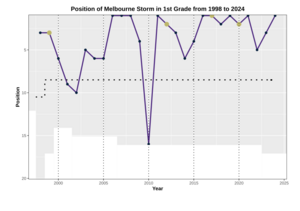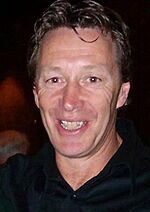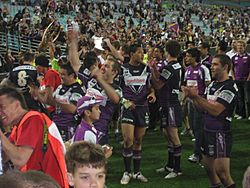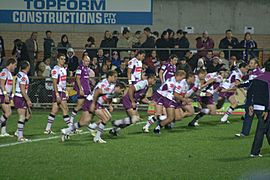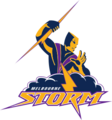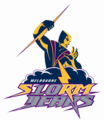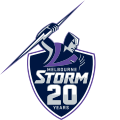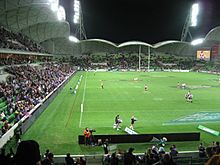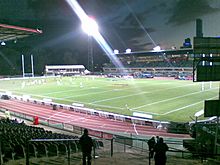Melbourne Storm facts for kids
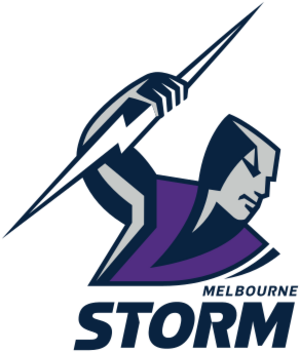 |
|||
| Club information | |||
|---|---|---|---|
| Full name | Melbourne Storm | ||
| Nickname(s) | Storm | ||
| Website | melbournestorm.com.au | ||
| Colours | Primary Purple Navy Secondary White Gold |
||
| Founded | 23 June 1997 | ||
| Current details | |||
| Ground(s) |
|
||
| CEO | Justin Rodski | ||
| Coach | Craig Bellamy | ||
| Captain | Harry Grant | ||
| Competition | National Rugby League | ||
| 2024 season | 1st (Runners-Up) | ||
| Uniforms | |||
|
|||
| Records | |||
| Premierships | 4* (1999, |
||
| Runners-up | 5 (2006, 2008, 2016, 2018, 2024) | ||
| Minor Premierships | 6* ( |
||
| World Club Challenge | 3* (2000, |
||
| Wooden spoons | 1 (2010) | ||
| Most capped | 430 - Cameron Smith | ||
| Highest points scorer | 2786 - Cameron Smith | ||
The Melbourne Storm is a professional rugby league team from Melbourne, Victoria, Australia. They play in the top-level National Rugby League (NRL) competition. Their home games are held at AAMI Park, and their team colors are purple and navy blue, with gold and white details.
The Storm was the first fully professional rugby league team in Victoria. They started playing in 1997 during a time when there were two rival rugby league competitions. After these competitions joined together, the Storm became part of the new united league. They have won four major championships, called premierships, in 1999, 2012, 2017, and 2020. They also reached the Grand Final several other times. The team won the 2007 and 2009 Grand Finals, but these titles were later taken away because the club broke some team rules about player payments.
The club also had a team in the NRL's Under-20s competition until 2017. In 2018, they started a new Under-20s team in Queensland. The Melbourne Storm has also expanded into netball, working with the University of the Sunshine Coast. Since 2017, their netball team, Sunshine Coast Lightning, has played in the Super Netball league. In 2024, the Melbourne Storm rugby league club had over 1 million fans.
Contents
- Club History
- Team Name and Colors
- Club Songs
- Team Rivalries
- Home Grounds and Fan Attendance
- Team Statistics and Records
- Players
- Supporters
- Feeder Clubs
- See also
Club History
How the Storm Started (1997–1999)
Rugby league became very popular in Melbourne in the mid-1990s. This led to plans for a Melbourne-based team. In 1997, a new league called Super League decided to create a team in Melbourne. John Ribot, a Super League leader, helped set up the club. Chris Johns became the club's first CEO.
In September 1997, Chris Anderson was named the first coach. The new team was called the Melbourne Storm, a name suggested by a local teenager, Cameron Duncan. The Storm signed many players from other teams that were closing down. These players included Rodney Howe, Robbie Kearns, Matt Geyer, Glenn Lazarus, and Brett Kimmorley.
When the Super League and the other main league joined to form the National Rugby League (NRL) in 1998, the Melbourne Storm became part of this new competition. In their very first game, they beat the Illawarra Steelers. Glenn Lazarus was their first captain. The Storm surprised everyone by winning their first four games. They made it to the finals in their first year but were beaten by the Brisbane Broncos.
In 1999, the Storm had a great season, winning eight of their first eleven games. They finished third in the league and made it to the Grand Final against St. George Illawarra. The Storm made an amazing comeback in the game to win 20–18, securing their first championship.
Changes and Challenges (2000–2006)
After their big win, the Storm had a slower start in 2000, losing their first four games. They still made the finals but were knocked out early. In 2001, coach Chris Anderson left, and Mark Murray took over. The team struggled and missed the finals in 2001 and 2002. CEO Chris Johns also left the club at the end of 2002.
The Craig Bellamy Era Begins
In 2003, Craig Bellamy became the new coach. He was known for his strict coaching style. Under Bellamy, the Storm quickly improved. They consistently reached the finals between 2003 and 2005. During this time, young stars like Billy Slater, Cameron Smith, and Cooper Cronk joined the team and became very important players.
In 2006, the Storm had an outstanding year, finishing at the top of the league for the first time. They lost only four games all season. They won their first two finals matches and were favorites to win the Grand Final. However, they lost 15–8 to the Brisbane Broncos.
Grand Final Success and Difficult Times (2007–2010)
In 2007, the Storm finished first again. They won their finals games easily and reached the 2007 NRL Grand Final against the Manly-Warringah Sea Eagles. Melbourne won the game 34–8, with Greg Inglis being named the best player on the field.
In 2008, the Storm finished first in the league again. They made it to the Grand Final but lost heavily to Manly, 40–0. Despite the loss, several Storm players won major awards that year.
The 2009 season saw the Storm finish fourth. They won their finals matches and reached their fourth Grand Final in a row. They beat the Parramatta Eels 23–16 to win another premiership. The Storm was even named the NRL Team of the Decade for the 2000s.
Salary Cap Issues
In April 2010, the club admitted that it had broken the NRL's rules about how much money they could spend on players' salaries. This is called the "salary cap." The NRL found that the club had spent too much money over five years. As a result, the NRL took away all the titles the Storm had won during this time. This included their 2007 and 2009 premierships and three minor premierships (for finishing first in the regular season). The club was also fined a lot of money and had all their points for the 2010 season taken away. This meant they finished last, even though they won enough games to make the finals.
In 2010, the Storm also moved into their new home ground, AAMI Park, in May. The stadium was supposed to open earlier, but construction delays pushed back the date.
Rebuilding and More Success (2011–2017)
After the salary cap issues, the Storm had to let go of some players and rebuild their team. They did this very well, and in the next two years, they returned to the top. In 2011, the club won what was considered their first official Minor Premiership. They also had a club record of twelve wins in a row. They just missed the Grand Final, losing in the preliminary final. That year, Billy Slater won the Dally M Medal, an award for the best player in the league.
In 2012, the Storm started strong with nine wins in a row. They finished second in the regular season. They won their finals games and then claimed their second official Premiership by defeating the Canterbury-Bankstown Bulldogs 14–4 in the Grand Final.
World Champions and Milestones
The Storm started 2013 by traveling to England and winning the 2013 World Club Challenge, becoming World Champions. Back in Australia, they continued their winning streak, setting a new club record of 15 consecutive wins. In May 2013, the club was sold to a new group of businessmen. On June 9, 2013, Captain Cameron Smith played his 250th game for the club. The Storm finished third in 2013 but were knocked out of the finals early.
The 2014 season saw more milestones. Both Billy Slater and Cooper Cronk played their 250th games, and coach Craig Bellamy reached 300 games as coach. In 2015, the Storm started well, being at the top of the league by Round 7. Cameron Smith played his 300th game, becoming only the 24th player in history to do so.
In 2016, the Storm continued to play well. They achieved their 300th NRL win and Craig Bellamy coached his 350th NRL game. The club also announced they would have a netball team, the Sunshine Coast Lightning, starting in 2017. This showed the Storm wanted to be more than just a rugby league club.
At the end of the 2016 NRL season, Melbourne finished first, winning their second official Minor Premiership. They made it to the 2016 NRL Grand Final but lost a very close game to the Cronulla-Sutherland Sharks.
Third Premiership Win
2017 was another very successful year for the Melbourne Storm, their 20th season in the NRL. After the disappointment of 2016, they dominated the 2017 season, finishing first and earning their third official minor premiership. They won 20 games and lost only four. Cameron Smith broke many records that year, including playing the most NRL games ever, and scoring his 2000th career point. The Storm continued their success into the finals, winning their first two games to reach their second Grand Final in a row. In the 2017 NRL Grand Final, they easily defeated the North Queensland Cowboys 34–6 to win their third official Premiership. Billy Slater won his second Clive Churchill Medal.
Recent Years (2018–2024)
After winning the 2017 premiership, the Storm hosted and won the 2018 World Club Challenge against the Leeds Rhinos. 2018 was also the club's 20th anniversary. The Storm played well again, just missing out on finishing first in the league. They made it to the Grand Final but lost to the Sydney Roosters.
In 2019, the Storm finished first in the league, winning the Minor Premiership. However, they were knocked out of the finals by the Roosters in the preliminary final. Captain Cameron Smith reached more huge milestones, including captaining his 300th game, becoming the game's highest point scorer, and playing his 400th NRL game – the first player ever to do so.
COVID-19 Challenges and Fourth Premiership
The 2020 season was very unusual because of the COVID-19 pandemic. Games were played without fans, and the season was changed. When the situation in Victoria got worse, the Storm had to move to Queensland to finish their season. Melbourne finished second in the league and then beat the Penrith Panthers in the 2020 NRL Grand Final to win their fourth official premiership. This cemented their place as one of the most successful clubs in modern NRL history.
In 2021, long-time captain Cameron Smith retired after playing 430 games. Jesse Bromwich and Dale Finucane became co-captains. The team had a few early struggles but then went on a winning streak of 19 games, which is a league record. This was even more impressive because they had to move to Queensland again due to COVID-19. They won the Minor Premiership but lost in the preliminary final. The club also broke several scoring records. Josh Addo-Carr scored a club record six tries in one game.
In 2022, Melbourne started strong but then had some losses, including their biggest loss since 2013. They finished fifth in the league, their lowest finish since 2014. They were knocked out of the finals by the Canberra Raiders.
In 2024, the Storm finished first in the regular season, winning the Minor Premiership. They reached the 2024 NRL Grand Final but were defeated by the Penrith Panthers.
Team Name and Colors
Choosing the Name
The club first thought about names like "Melbourne Mavericks." However, officials decided against it because it sounded too American. Other ideas included "Trams" and "Flying Foxes." In the end, the club chose "Melbourne Storm" after a competition. A Melbourne teenager named Cameron Duncan suggested the winning name.
Team Colors
The Storm wanted to use the colors of their state, Victoria (navy blue with a white 'V'). But a club consultant suggested adding purple and gold to make their merchandise more appealing. So, the official colors of the Storm are navy blue and purple (main colors) and white and yellow (minor colors).
All four colors were in the logo until yellow was removed in 2018. The home jersey designs have changed over the years. Gold was removed for a while and then brought back. Purple became the main color in 2010. In 2013, a new design with more navy blue was introduced. The "V" shape on the jersey also changed over time.
From 1998 to 2001, Melbourne was the only club to have player names on the back of their jerseys. This helped new fans recognize the players. In 2001, they got their first main sponsor, Adecco, whose logo was on the front. In 2002, player names were removed, and the sponsor's logo was put on the back.
Club Logo
The club's first logo, called "Storm Man," showed a figure riding storm clouds and throwing lightning. This logo was used until the end of 2017. For their 10th anniversary in 2007, a special logo was made for merchandise.
For their 20th anniversary in 2018, the Storm introduced a new shield-shaped logo with "Melbourne Storm 20 Years" on it. After the celebrations, the club updated the logo again. The current logo is similar to the 20-year one but without the shield. It has bolder "Melbourne Storm" text, and the color yellow was removed. There is also an all-white version of this logo used on the home jersey.
- Melbourne Storm – Logos
Club Songs
The Melbourne Storm has several club songs. The main song, "We Are the Storm," is played after every home victory. The AC/DC song "Thunderstruck" is played when the team enters the stadium for home games. After each win, the players also sing "We are the mighty Melbourne Storm" in the changing rooms. This song uses the tune of the US Marines' Hymn.
Team Rivalries
St. George Illawarra Dragons
The rivalry between St. George Illawarra and Melbourne was strongest after the 1999 NRL Grand Final, which Melbourne won closely. The next year, a St. George Illawarra player said Melbourne wasn't a "worthy premier." Melbourne responded by winning 70–10. Later that season, St. George Illawarra won 50–4. This rivalry has become less intense in recent years.
Brisbane Broncos
The Storm has a strong rivalry with Brisbane, mainly because they have played many important finals games against each other. Melbourne has won most of these matches. The fact that Craig Bellamy, a former Brisbane assistant coach, moved to Melbourne also added to the rivalry. Many Queensland Origin players have played for both teams.
Darren Lockyer, a former Brisbane player, said in 2009, "When Bellamy left here and went to Melbourne, the rivalry with them went up a notch then... their record is good against us."
Cameron Smith, the Storm captain, also commented in 2009, "A lot of people talk about us and Manly, but I think all the boys for whatever reason would say we take more satisfaction out of beating the Broncos...we love playing them...there is always plenty of feeling and intensity in the games...it probably wouldn't feel like September if we weren't playing them at some stage."
Since the 2006 Grand Final, Melbourne has lost to Brisbane only five times in 36 matches. In 2023, Brisbane beat Melbourne in a qualifying final, which was their first win against Melbourne at Suncorp Stadium since 2009.
Manly-Warringah Sea Eagles
This rivalry started between 2007 and 2012 when both clubs were often at the top of the league. In the 2007 NRL Grand Final, Melbourne beat Manly. The next year, in the 2008 NRL Grand Final, Manly beat Melbourne 40–0. In 2009, Melbourne ended Manly's season in the finals.
In 2011, the rivalry became even more intense during a game known as the "Battle of Brookvale." A large fight broke out on the field and continued as players were sent off. This incident involved many players and officials. The head of the NRL, David Gallop, strongly criticized both clubs.
In 2012, Melbourne again defeated Manly in the preliminary final, stopping them from winning back-to-back titles. The matches between the two teams were calmer for a decade. However, in the 2021 finals, Melbourne again defeated Manly with a score of 40–12, which was the third time that exact score had happened between them.
New Zealand Warriors
This is a traditional rivalry because many New Zealand players have played for Melbourne over the years. Games between these two clubs are usually close. Melbourne has won more games overall. They used to play an annual ANZAC Day game from 2009 to 2014, and it has been played every ANZAC Day since 2016 (except 2020). Both teams play for the Michael Moore Trophy.
The two teams have met twice in the finals. In 2008, New Zealand caused a big upset by beating Melbourne in the first week of the finals. In 2011, New Zealand again upset Melbourne in the preliminary final, stopping them from reaching the Grand Final.
Sydney Roosters
This rivalry began in 2017 when the two clubs played a very close game that the Roosters won in extra time. Seven weeks later, Melbourne won the return game. The rivalry grew stronger when long-time Storm player Cooper Cronk moved to the Roosters in 2018.
In 2018, the Roosters beat Melbourne in the 2018 NRL Grand Final. Cooper Cronk, playing with an injury, helped the Roosters win against his old team. In 2019, the teams had two more close games, and the Roosters again beat Melbourne in the preliminary final.
In 2020, during the COVID-19 pandemic, a game between them had an extraordinary finish. The Roosters were leading, but Melbourne scored late tries to take the lead. The Roosters then tied it with a penalty goal and scored a field goal. With seconds left, Melbourne's Ryan Papenhuyzen scored his own field goal to tie the game again, sending it to extra time. Melbourne won with a penalty goal.
As of the end of the 2021 season, Melbourne had won all three of their recent games against the Roosters, including a big 46–0 win in 2021. In 2022, the Roosters narrowly defeated Melbourne in a very intense game with many penalties. In the 2023 finals, Melbourne beat the Roosters in a close match.
Penrith Panthers
This rivalry started in 2018 when the Panthers beat the Storm, stopping them from winning the minor premiership. Before this, the Panthers had a very poor record against the Storm.
However, since 2020, their rivalry has become much more intense. It began with the 2020 NRL Grand Final, where the Storm won 26–20, ending the Panthers' 17-game winning streak.
In 2021, they played twice, including a close game where the Panthers won 12–10. They met again in the preliminary finals, where the Panthers won 10–6 before going on to win the Grand Final. In 2023, Penrith comfortably beat Melbourne 38–4 in the preliminary finals. In 2024, the Storm won both regular season games against the Panthers. The two teams met again in the Grand Final, where Penrith won 14–6.
Home Grounds and Fan Attendance
Melbourne's current home ground is AAMI Park, which they have used since 2010. Before that, they played most of their home games at the now-demolished Olympic Park Stadium. Fans called it "The Graveyard" because the Storm won 77.2% of their games there. The club played its first home game at Olympic Park on April 3, 1998, winning 26–16 against the North Sydney Bears. The crowd of 20,522 was the largest attendance for the club at Olympic Park.
The Melbourne Storm also helped set a Rugby League World record attendance of 107,999 people. This happened during the 1999 NRL Grand Final at Stadium Australia, where they won their first NRL premiership. This record cannot be broken because the stadium's capacity has since been reduced.
The team stayed at Olympic Park until the end of the 2000 season. They then moved to the larger Docklands Stadium because their average home crowds were growing. However, Docklands Stadium was mainly for AFL games, and it was hard to change the seating for rugby league. Also, the team missed the finals that year, so crowd numbers went down. They decided to move back to Olympic Park. Docklands Stadium was still used for home finals until 2010, and a record home final attendance of 33,427 was set there in 2007.
From 2002, crowd numbers dropped, reaching their lowest average of 8,886 per home game in 2004. But the Storm started signing new and exciting players, and crowds steadily increased. By 2010, the average crowd was 14,670. The Storm played their last game at Olympic Park on August 29, 2009. They then moved to AAMI Park, though construction delays meant their first game there wasn't until May 2010. Since then, almost all Storm home games have been played at AAMI Park.
After winning the 2012 premiership and having continued success, crowd numbers kept rising. The club's highest regular season attendance at AAMI Park was 28,716 on April 25, 2014, for the ANZAC Day match. Average crowds reached a record high of 18,375 by the end of the 2017 season. The club's highest official "home" attendance was 52,347 in 2016, during a special doubleheader game in Brisbane.
For most of the 2020 and 2021 seasons, the Storm played their home games at Sunshine Coast Stadium in Queensland. This was due to strict COVID-19 rules in Victoria.
Team Statistics and Records
As of the end of the 2024 NRL season, the Storm has won four NRL Premierships (1999, 2012, 2017, and 2020) and six Minor Premierships (2011, 2016, 2017, 2019, 2021, 2024). Two other premierships (2007 and 2009) and three minor premierships (2006, 2007, 2008) were taken away due to salary cap rule breaking. Their current winning percentage of 67.14% is the best in the league.
The player with the most games for the Storm is Cameron Smith, who played 430 NRL games. This is also the current league record, and he is the only NRL player to reach 400 games. Smith is also the league's highest point scorer with 2786 career points. Fullback Billy Slater is the club's top try scorer with 190 tries.
Melbourne Storm players have won the Dally M medal six times: Smith in 2006 and 2017, Slater in 2011, Cooper Cronk in 2013 and 2016, and most recently Jahrome Hughes in 2024. The Storm has also had five Golden Boot award winners, more than any other club.
Melbourne Storm's record for the most consecutive wins is 19 matches, achieved between rounds 4 and 23 of the 2021 NRL season. This equals the league record set in 1975. The club's highest score is 70 points, which they have achieved twice. Their largest winning margin is 64 points, also achieved three times.
Players
Current Squad
First Team Ever (1998)
The first Melbourne Storm team to play in Round 1 of the 1998 NRL season was:
| Inaugural Team | Interchange | Coach | |||||||
|---|---|---|---|---|---|---|---|---|---|
|
|
Head coach
Updated: 23 July 2020 |
|||||||
Team of the First 20 Years (2018)
To celebrate their 20th anniversary in 2018, the Melbourne Storm announced their "Team of the First 20 Years." This team includes the best players who have worn the purple jersey over two decades.
| Team of the first 20 years | Interchange | Coach | |||||||
|---|---|---|---|---|---|---|---|---|---|
|
|
Head coach
Updated: 6 March 2018 |
|||||||
Supporters
The Storm has built a very loyal fan base over the years. In 2004, they had almost 500,000 fans, which grew to nearly 800,000 by 2009, making them the fourth most popular NRL team. The club's main fan group, the "Graveyard Crew," creates a special banner for the team to run through before each home game.
By 2019, a record 25,208 people had signed up as season ticket holders. This record was broken in 2021 with over 27,000 members. In July 2022, the Storm reached 37,237 members, which is the highest membership number ever recorded by an NRL club.
Well-Known Supporters
- Dylan Alcott – Former Australian Paralympian Tennis Player
- Waleed Aly – TV personality
- Billy Brownless – Former AFL player and TV/Radio personality
- Jim Courier — Retired American tennis player, Four time Tennis Grand Slam champion.
- Charlie Cameron, Australian rules footballer
- Sarah De Bono – Australian Musician
- Mitch Duncan – Australian Rules Footballer
- Malcolm Fraser − Former Prime Minister of Australia
- Josh Frydenberg − Australian politician
- Julia Gillard – Former Prime Minister of Australia
- Bob Geldof – International Musician
- Tom Hafey – Australian Rules player and coach
- Peter Helliar – Australian comedian
- Dave Hughes- Radio personality
- Lydia Lassila – Australian Winter Olympian
- Nicole Livingstone – former Australian Olympic Swimmer
- Molly Meldrum – music critic and producer
- Koti Ngawati – Australian Olympic swimmer
- Jana Pittman – dual Australian Summer/Winter Olympian
- Storm Sanders – Australian tennis player
- James Sherry — TV presenter
- Bill Shorten – Australian politician
- Peter Siddle – Australian Test cricketer
- Bob Skilton – former Australian Rules Footballer
- Archie Thompson – former Australian Socceroo
- Mark Viduka – former Australian Socceroo
- Max Walker – former Australian cricketer and Australian Rules Footballer
- Shane Watson – Former Australian Test Cricketer
- Jamie Whincup – Australian motor racing driver
Feeder Clubs
In 1998, the Storm started working with the Norths Devils in the Queensland Cup. This club helped develop players for the Storm's main team. Many players who played for the Storm in the 2006 Grand Final had played for the Devils. In 2005, the Storm also partnered with the North Sydney Bears.
Melbourne later ended its partnerships with the Bears (2006) and the Devils (2007). They then worked with the Central Coast Storm in the New South Wales Cup. After two seasons, the Storm decided to create their own team in the NSW Cup in 2010. This didn't work out well, so in 2011, they went back to the Queensland Cup, partnering with the Easts Tigers (now Brisbane Tigers). In 2014, they added a second feeder club, the Sunshine Coast Falcons, also from the Queensland Cup. The Storm also decided that their Under 20s team would be based on the Sunshine Coast from 2016.
Feeder Club History
- Norths Devils – (Queensland Cup) 1998–2007
- North Sydney Bears – (New South Wales Cup) 2005–2006, 2024–current
- Central Coast Storm – (New South Wales Cup) 2008–2009
- Melbourne Storm – (New South Wales Cup) 2010
- Cronulla-Sutherland Sharks – (New South Wales Cup) 2011–2014
- Brisbane Tigers – (Queensland Cup) 2011–current
- Sunshine Coast Falcons – (Queensland Cup) 2015–current
See also
 In Spanish: Melbourne Storm para niños
In Spanish: Melbourne Storm para niños
- National Rugby League
- Rugby league in Victoria
- Victorian Rugby League
- National Netball League
- Sunshine Coast Lightning
 | Aurelia Browder |
 | Nannie Helen Burroughs |
 | Michelle Alexander |


